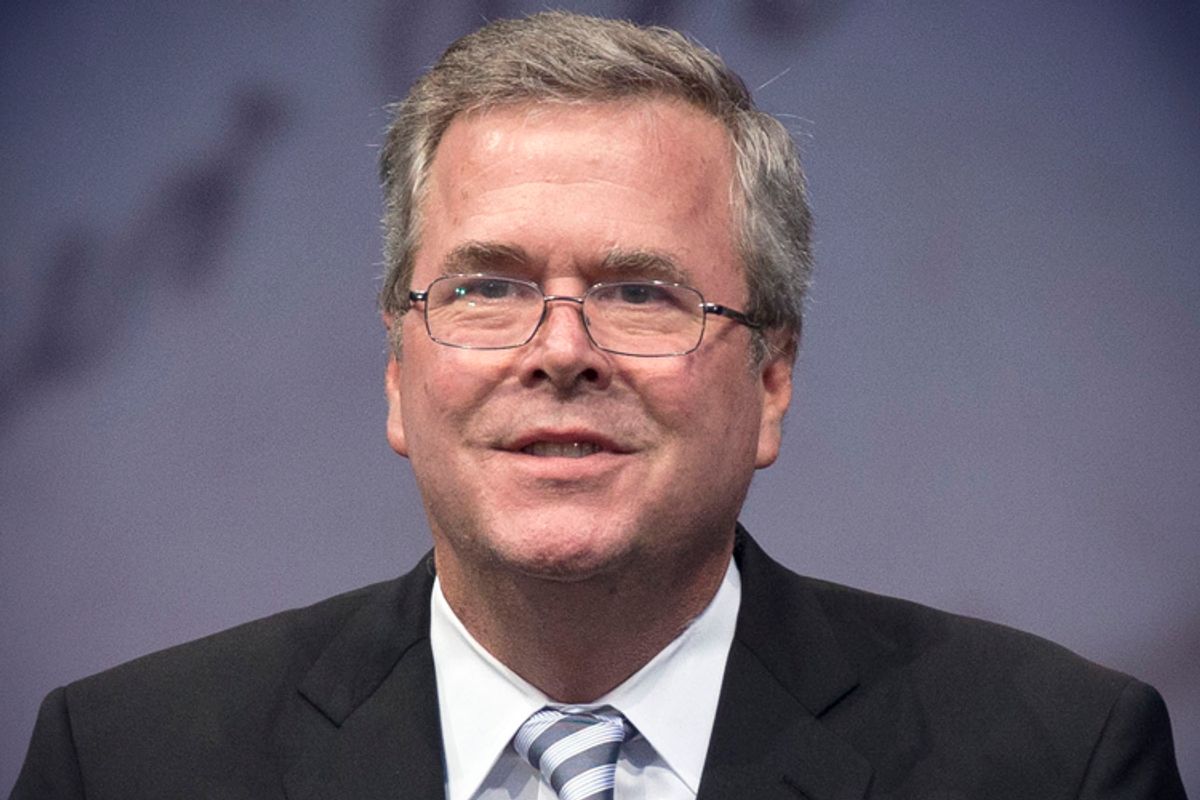When Jeb Bush announced yesterday that he is "actively exploring" a presidential bid and would form a political action committee next month, the former Florida governor sent the surest sign yet that he's likely to enter the 2016 contest. While much of the ensuing punditry focused on the implications for the Republican presidential field, his announcement may have political ramifications beyond the race for the White House. By moving toward a presidential run, Bush may have just increased Republicans' chances of holding on to the U.S. Senate in 2016.
Here's why. Though Florida Sen. and Bush protegé Marco Rubio's camp insists that his decision on a White House bid won't hinge on whether Bush enters the race, few observers expect Rubio to launch a campaign if Bush runs -- not so much because they see Rubio as unwaveringly loyal to Bush, but simply because their fundraising and political networks overlap too much, and most major donors and operatives close to the two men would back Bush over Rubio. So Rubio is now far more likely to seek reelection to the Senate in 2016 -- and that could pose a major complication for Democratic efforts to retake the chamber.
As he weighs his political future, Rubio has said that he'll run for either Senate or president -- but not both. (Rubio has also signaled that he may retire from politics altogether, but his recent meeting with major GOP donors to discuss 2016 indicates that he's unlikely to do so.) Democrats hoping to capture Rubio's seat would much prefer an open seat contest, given that Rubio would boast the built-in advantages of incumbency if he sought reelection. With Bush now looking increasingly like a presidential candidate, Florida Democrats will probably have to field a challenger against an incumbent senator -- not an impossible fight, particularly in a presidential year in a swing state, but a more difficult fight than they'd prefer. As a result, their odds of ousting Mitch McConnell as majority leader are likely a little longer now.
Come January, Republicans will control 54 Senate seats, while Democrats will control 46. To wrest the Senate from the GOP, Democrats will need to win at least four seats; if a Republican wins the presidency in 2016, Democrats will need to gain five seats, since a Republican vice president would break a 50-50 tie. With Republicans defending Senate seats in seven states President Obama won in both 2008 and 2012 -- and Democrats defending only states the president won twice -- there's certainly a plausible path back to Senate power for the Democrats. But it remains unclear what the political climate will be almost two years from now, and historically, the incumbent president's party does not make big gains in the final year of his presidency.
Moreover, some GOP senators who would appear vulnerable on paper stand fairly decent chances of winning reelection. In Iowa, which Obama won twice, voters approve of Sen. Chuck Grassley's job performance by a margin of 59 to 28 percent, according to a Public Policy Polling survey released last month. Democrats' best hope of winning his seat is for Grassley, who will be 83 on Election Day 2016, to retire, but he has already declared his intention to seek a seventh term.
Meanwhile, Democrats hope to knock off Sen. Kelly Ayotte in New Hampshire, but PPP found that voters approve of her job performance by a 49 to 32 percent margin; Ayotte also starts off with a modest, if not insurmountable, lead over Gov. Maggie Hassan, who is widely seen as the Democrats' most formidable candidate.
As for Rubio, his reelection campaign wouldn't be a cakewalk; according to PPP, 41 percent of voters disapprove of his job performance, while 40 percent approve. But senators with underwater approval ratings aren't doomed to defeat, and Rubio's fundraising prowess ensures that he'll be a tough opponent for any Democrat who decides to run against him.
Democrats also have to worry about at least two seats where their incumbents won close races in 2010. In Nevada, Harry Reid would be a decided underdog if popular GOP Gov. Brian Sandoval challenged him. A bit further east, Colorado Sen. Michael Bennet barely defeated an inflammatory Tea Party Republican in 2010, and PPP found last month that only 30 percent of voters approve of his job performance, against 35 percent who disapprove. So even states that Obama won in 2008 and 2012 aren't exactly in the bag for Democrats.
The bottom line: A lot has to go right for Democrats to win back Senate control in two years. And Jeb Bush's nascent presidential candidacy represents at least a mild setback.

Shares